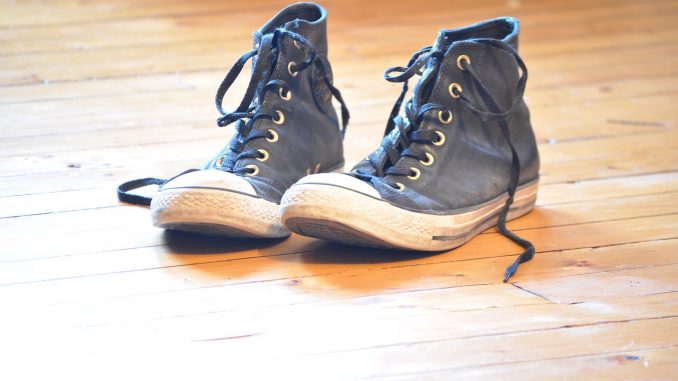
Trainers on a wooden floor. Image credit: Pixabay
When getting dressed, I habitually think about my potential safety. Glancing in the mirror, ticking criteria off my mental checklist, all in the hopes I’ll get through the day unscathed and unbothered.
Recently, I’ve been thinking about my footwear. Can I run in these? Are they grippy? Can I get from home to B and back again? But, Sarah Everard was wearing running shoes in broad daylight and Wayne Couzens still murdered her. So what’re we to do, when the things we’re told will keep us safe don’t work? Doesn’t that suggest the narrative’s floored?
Public discourse has codified a safe existence for women, making it conditional and the responsibility placed solely at our feet. Our appearance constitutes large clauses of this code. Don’t wear anything short, don’t smile too much, don’t do this or that or this. Like others, I’ve been led to believe appeasing this criterion will keep me out of harm’s way.
Sarah’s not alone. Women around the world are disappearing, dying and being harassed when running, walking, clubbing and trying to exist. Research by UN Women UK found that as of 2021, 97% of women have been sexually harassed. With 96% choosing to not report these instances because of beliefs that little would change.
Commonly, these incidences are met with the response that we as women should alter our behaviours, routines and lives to evade harm. We do need to contemplate personal safety, but when people actively endanger our lives the problem is not with us.
Social media platforms and news organisations assist in the dissemination of this rhetoric. This year, as ‘needle spiking’ hit the headlines, Durham University coined the hashtag ‘don’t get spiked’. This was met by widespread media outrage, but they have not always been so quick to defend victims of spiking and sexual violence. In 2016, a Sun tweet reading “woman drank six jagerbombs in ten minutes on the night she was raped and murdered” sparked a media frenzy.
Huffington Post responded with an article titled, “A Woman Was Raped and Murdered. Why Is Her Drink Count Relevant? The piece concludes that The Sun was not only complicit in victim-blaming, but reinforced the notion of excusable rape upon the involvement of alcohol. Corrine Barraclough, a Daily Telegraph columnist hit back, arguing that “Attempting to perpetuate the “right to get drunk” is an alarming feminist fantasy.”
She continued to explain, “If you can’t guarantee your behaviour – or protect yourself when blotto – how can you have a right to get drunk?” Corrine, we’re trying to keep ourselves safe when we’re sober too and that’s not working? Rightly, she highlights that as a society, we have an unhealthy relationship with drinking. However, she fails to consider that external threats shouldn’t mean we have to remove ourselves from environments and activities that make us happy.
Sarah’s death single-handedly undermines Corrine’s closing statement, “Step off ‘Feminist Fantasy Island’, get streetwise, and start empowering women to make educated choices.” She was streetwise, she made all the ‘educated choices’, yet Couzens still decided to murder her.
